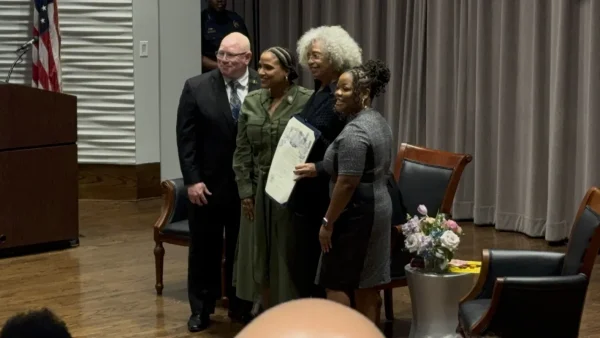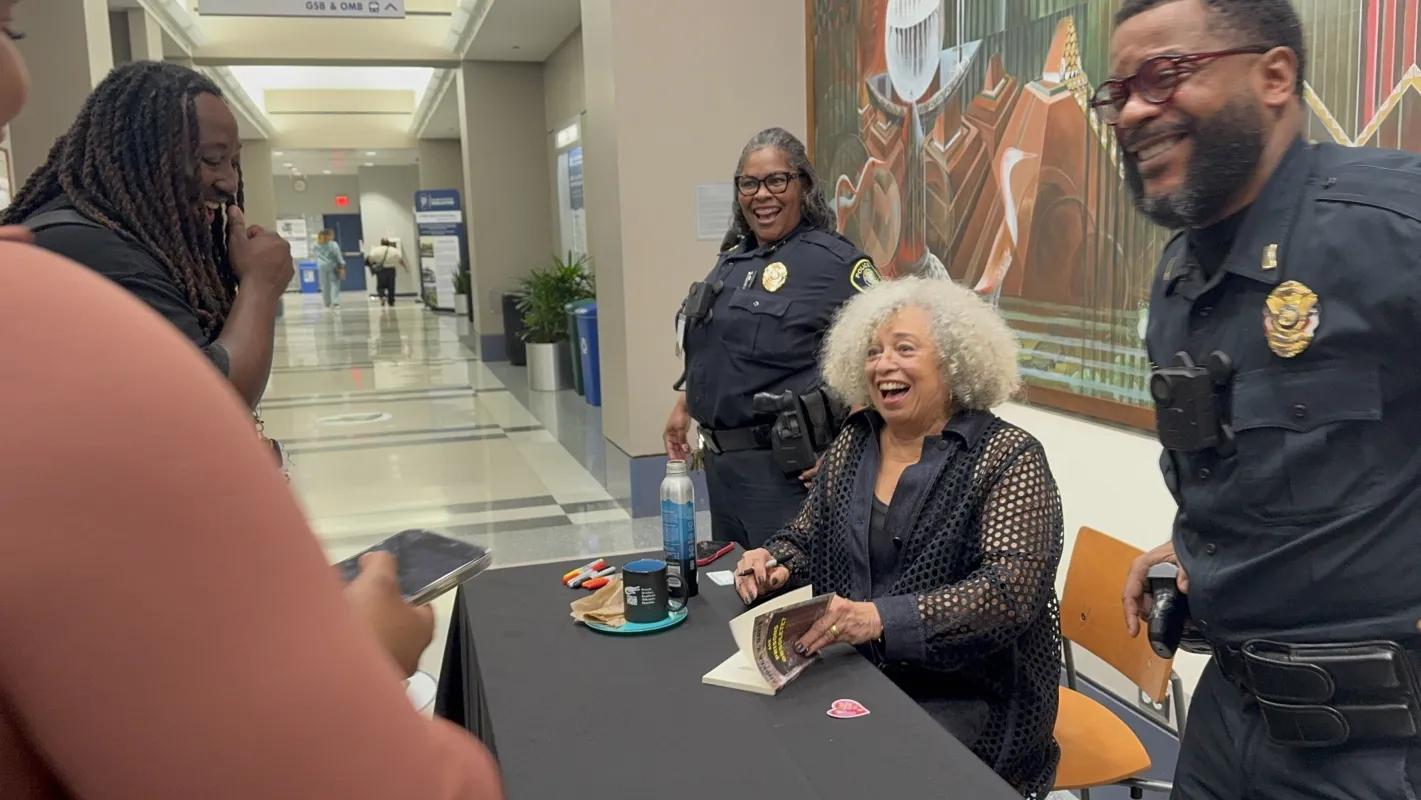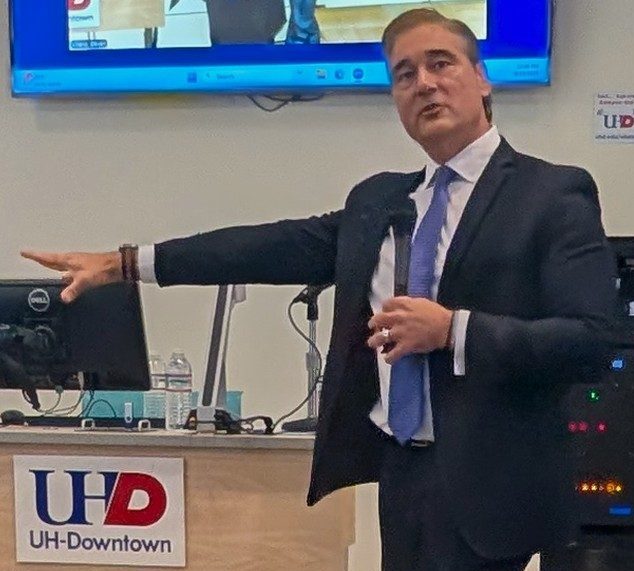UHD’s Center for Social Inquiry & Transformation welcomed scholar, author and activist Angela Davis as their inaugural lecturer on April 3. Wrapping up a week’s worth of events commemorating her legacy in fighting for civil justice, she sat down with CSIT Director Vida Robertson and Vice Chair of Harris County Women’s Commission, Felicia Harris for a moderated discussion over leadership in difficult times. After the lecture, city council member Tiffany Thomas, on behalf of the City of Houston, officially proclaimed April 3 as Angela Davis Day.
The lecture was held at the Wilhelmina Cullen Robertson Auditorium in the Academic Building. Even though the lecture was scheduled to start at 5:30 p.m., the line of eager listeners started to form outside the auditorium as early as 4 p.m.
When the doors finally opened at 5 p.m., everyone filed in and settled down, ready to listen. Almost every seat in the auditorium was filled, and volunteers walked around asking attendees to fill in skipped seats in order to make room for everyone. Once every seat was filled, there was another room in the Academic Building streaming it live for anyone who couldn’t find a seat in the auditorium.
The lecture began with Robertson giving a heartfelt welcome message over the “true work” being done here at the university.
“They might have tenured me as an English and humanities professor, but I am here to proclaim to you that I am an understudy of the powerless and the oppressed and that my real job is to empower my students and my colleagues to be the best version of themselves,” said Robertson.

He thanked key members of the program for not only allowing the event to take place, but also for the continued furthering UHD’s mission to represent and fight for marginalized communities. Davis was introduced, and everyone in the auditorium stood on their feet to welcome such a distinguished guest. After a minute-long standing ovation, the crowd settled into their seats, and the panelists immediately jumped into topics relevant to her book “Freedom is a Constant Struggle.”
Co-panelist Harris opened the discussion seeking advice on living in a city as diverse as Houston, set against the backdrop of a racist state, that is so adamant on upholding hurtful policies in institutions, especially academic ones. Davis acknowledged how the summer of 2020 was a time that favored the further development of not only academic institutions but also all institutions.
However, instead of continually advancing and celebrating milestones, Davis claims that the public is at what she calls a “historical conjuncture,” where they must fight for the capacity to continue the process of advancement.
She challenges that these institutions cannot be reformed here and there but rather have to be completely reimagined.
“What kind of society do we need in order to not rely on these institutions that are saturated with racism and continue to breed oppression?” Davis asked the audience to ponder.
Most importantly, she reminds everyone to recognize their agency and power in controlling how things unfold.
This led to Harris’s next topic: the danger of academic freedom being targeted and what comes next if these targets are met. Davis reminds the audience that they have already experienced this before, and there is no answer but to join the struggle.
“You don’t have to succumb to the tendency to do nothing, simply because the conditions of struggle are too difficult,” said Davis.
Seeing as UHD is situated straight across from “the largest county jail in the state and one of the largest in the country,” Robertson took the opportunity to ask Davis about the concept of the prison industrial complex.
Having had a historical prison case and trial, Davis has done extensive work to fight against the PIC. She could go “on and on about it forever,” as she put it, but she essentially connected the PIC to higher political and economic institutions, once again emphasizing the need for a reimagining of these pre-established institutions.
Robertson again shifted the discussion towards the importance of the intersections between all races and how the genocide in Palestine is relevant to communities here in the US. Davis shared a story of how a poem found in the cell of activist George Jackson, circulated among the Black Panther Party, only to find out it was written by a Palestinian poet as resistance literature.
The crowd was moved as she connected communities through resistance, emphasizing that, separately, the power of individual ethnic groups is not distinct, and these institutions are only defeated by coming together.
Harris wrapped up the discussion by acknowledging the “92%,” a name given to the 92 percent of Black women who voted for Kamala Harris in the election, and how to handle the feeling of burnout they and many others were experiencing after this last election.

“That’s not an excuse to stop,” said Davis. “If we lose hope, we’ve given up. We’ve given up [on] the future. We are the evidence of generation, after generation, after generation of hope, and it’s the least we could do to continue that legacy.”
Davis ended her lecture with a reminder that change happens as a consequence of movements, collective imaginations, and people’s capacity to come together and envision a different future.
On behalf of UHD’s Feminist Literature Club, Davis was given a basket of goodies as a token of gratitude to remember her time at UHD, including gator merch and a Palestinian scarf, presented by Associate Director of the Office of Study Abroad Claudia Baba and UHD student Sydney Castro.
Robertson then introduced Houston Council Member Tiffany Thomas to join them on the stage. She presented Davis with a record that acknowledged her presence as UHD’s 2025 Scholar in Residence and honored her lifelong contribution to advancing justice through activism, peace, and scholarship.
Thomas, on behalf of the mayor and the city of Houston, officially proclaimed April 3 as Angela Davis Day. Everyone gathered on their feet to applaud Davis. This lasted for over a minute until she was walked out of the auditorium.
Davis was hosting a book signing at the Sky Lounge after the lecture, and a line formed. The line wrapped around the Skyline Lounge and took over an hour to get through.
When asked about what it meant for them to be able to host these incredible and inspirational events, Robertson was at a loss for words.
“It is a real pleasure and an honor,” Robertson remarked. “I am blessed not only to embrace the needs of my community but to have the funds to facilitate it, to have the leadership embrace it, and to have so many people come out and participate. Life doesn’t get better than that.”
Harris’s feelings were mutual, stating, “As a Black woman in academia, Angela Davis is at the top of who I imagine to be an exemplar of a woman in academia. To say that I’ve learned a lot from her is an understatement, and to have her here in the place where I currently work and teach…It is a full circle moment.”
In a quick interview during the signing, Davis was asked what her week at UHD meant to her, to which she replied, “I feel like I’m gazing at the future that we’re struggling for. The students are really smart. I love the way they formulate questions, and this is a powerful example of why precisely we need universities.”






